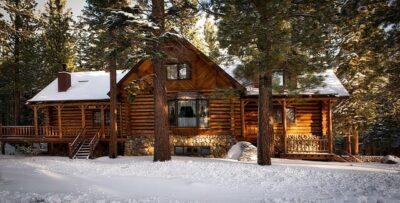Going off-grid means different things to different folks. For some, it’s living a “normal” life without an electric bill. For others, it’s a dance of compromise with what you are willing to live without and what you won’t live without; making those things you deem necessary for your life run off power you generate yourself. And for still others, off-grid living is a couple of solar panels deep in the woods somewhere with just the bare minimums.
Whatever your version of off-grid living is, there are several key questions to ask before you take the plunge.
What is it that you want to accomplish, and what does your off-grid life look like?
This is truly the first step, before you look at pretty solar packages and rugged wind generators. Long before you start looking at wattages and discussing power storage, you need to determine just what you want from an off-grid life.
I’ll give you three very different examples:
The first, is my parents. When we were selling our house in Mississippi to move to Southern Oregon and go off-grid, they decided it was something they wanted to do, as well. My dad knew he wanted to be able to live a pretty normal life. He enjoys watching TV, my mom likes to sew and watch movies. They run a construction company from their house, and always have computers, scanners and printers working. They grow a garden and put up some of their own food, so they knew they’d need a freezer (or three). My mom very much likes modern conveniences and already had her eyes on a new Samsung side-by-side refrigerator, long before the final design for their new house was done. Dad knew they would have to save power where they could, so they went with wood heat; propane water heating, cooking and clothes dryer; LED and energy efficient lighting and appliances; and, of course, a diesel backup generator for those snowy winter days when the sky barely peaks out. They settled on a 4,500-watt system with a 40kw backup battery bank.
Get Free Backup Electricity — That Works Even During Blackouts!
Next is us. Unlike my folks, we run a full homesteading operation here. We don’t mind minimums. We have no TV service of any kind and use our TV on those rare occasions that we feel like watching movies or old TV shows on DVD that we can pick up for cheap at the local Walmart. We have a very basic washing machine and no dryer of any kind. Our biggest splurge for household appliances is our super-efficient French door refrigerator, and two super-efficient freezers that we keep full enough and in an insulated building so that they don’t run much. Our main heat source is wood, and we use propane for backup heating, cooking and water heating.
We have two main barns with lights that get turned on for winter feeding. There are lights in the rabbit barns, as well. We also hatch poultry from April until October, so we run a full-sized cabinet incubator and up to two brooder pads. In the summer, we also run fans in the poultry and rabbit houses. In addition, we have a well with a 2hp pump that runs 2 hours a day from May until late September to water our garden. We also use the well to fill our cistern and a much smaller pump to take water into the house. When we sized our system, we wanted the very minimal usage of the diesel backup generator. We ended up with a 6,000-watt system and the same 40kw backup battery bank.
If you are thinking these first two are very large systems, you are right. So here is an example of going the absolute other direction. I met this young lady who lives about 15 miles from us. She lives in a camper that she built a roof over. She has a well that she runs with a 6,500-watt generator, and she pumps her water into a tank that she has hooked up to the camper. She can charge her camper battery bank with a 150-watt solar charger kit. Heating, water heating and cooking are all done with propane. Her battery system is modified from the original, and she uses four 6volt deep cycle RV batteries. When the snow gets deep and she can’t keep the panels clear, she simply charges up her batteries with the generator and if she’s careful, can go for several days.
No matter what you want your life to look like, it’s easiest to make it happen if you can fully define your version.
What is your current power usage? What do you have now that you can live without?
Whether you have an existing home you are taking off the grid or building a new home, it’s important to have a base starting point such as a current power bill. This gives you an idea of what you use right now with the appliances and gadgets you have currently. If you plan to live just as you do now, is it possible to generate the amount of power that you presently use, or are you going to have to modify your lifestyle a bit?
When we planned our solar, we set out our highest bills (one summer, one winter) to give us our starting point. We lived in a house with electric cooking, electric water heating and central heat/air, all of which we knew would not be feasible to support with a solar system. Then we went room by room and determined what we would need at the new house, what we needed that would have to convert to propane, and what we flat out could live without. There was also a short list of items we use every now and then, such as food dehydrators, clothes irons and waffle makers. We then looked at the power requirements of each item.
Next, we went through the drawings we’d done of our new property to determine if there were power needs there that we didn’t currently have. A well pump. Barn lighting. A bigger incubator and an extra brooder pad. All these things were figured out well before we looked at systems.
(To determine what the power usage is on appliances and gadgets, there are a number of places to look – owner’s manuals, product plates placed by the manufacturer, or any one of a number of websites.)
Does everyone in the household agree with the vision?
No matter what type of system you have, you need to make sure that everyone in the household is on the same page and understands that off-grid living is a change, regardless of system size. If you are going solar, then you already know that when there is no sun, less power is being generated. This means that you aren’t running the washing machine before bed, the kids aren’t up all-night binging on video games, and that non-essential devices are off.
Earlier this year our 18-year-old nephew moved in with us. He’d been here to visit a few times before and had stayed for a long weekend a couple months before making the move. We explained at length how the system worked, and why we have a lights-out-at-10 p.m. policy around here. He doesn’t own much, just a few clothes, a cell phone, a beat-up car, and a computer that he’ll need when he gets started at the local Community College this fall. He didn’t mind the power restrictions, and we figured we could make the computer work, so he moved in.
It’s Backup Electrical Power In A Convenient, Portable Briefcase!
Within two weeks, we found out that he is also an avid gamer. As in, sit-in-front-of-the-computer-for-hours-on-end type gamer. And the simple desktop computer for school? It’s a high-end gaming computer that draws 500 watts when it’s on! (For reference, my desktop computer uses around 125 watts.) Needless to say, it’s not a problem during summer days when we have power to spare, but we’ve already had the talk that he’s going to need a laptop for school usage, as we simply won’t be able to support the power on that big beast during the winter months and evenings that he needs to be studying. There was a surprising amount of whining and complaining, but he’s come around.
We would strongly suggest you make sure, on the front end, that everyone in the household understands exactly what off-grid living will mean to their daily life.
Can you install everything yourself, or are you going to have to hire out?
Depending on the size of your off-grid system, this can be a very big deal. If you plan a small system of a few panels or a small wind turbine, a small inverter and a couple of batteries, you may be more than capable of doing it yourself. Larger systems require a good understanding of what you are dealing with, as inverters and charge controllers can be very complex.
Beyond the electrical work required to install an off-grid system, you may require mechanical assembly and/or construction work. Even the smallest of solar arrays require some sort of racking assembly. Wind turbines require tall poles with ground tethers. You’ll need a dry place with good ventilation to house not only your inverters but also your battery bank.
We were fortunate that my father has spent his entire life in the construction industry and that my husband is a mechanical engineer by trade as well as being a car enthusiast in his spare time. Installation of our system required concrete work, rack construction, underground conduit installation, battery box construction and wiring. Lots and lots of wiring.
Even though we had the experience to put our system in, mistakes were still made. A wire was hooked up incorrectly that resulted in both of our charge controllers getting blown. It was our mistake and a fairly costly one — new controllers cost us an extra $1,000.
Can you maintain your system yourself?
For the most part, maintaining an off-grid system is pretty simple. However, when compared to an on-grid lifestyle there is much more to it. Not only do battery charge levels need to be monitored daily to ensure that there are no problems, but batteries themselves will need to be regularly maintained and even periodically replaced. Solar panels may need to be adjusted several times per year for maximum solar gain, cleared of snow in winter, or washed down during heavy pollen or if your area gets dusty during the latter part of summer. Wind power is also not without its maintenance, including checking connections and bolts, adjusting tension on guy wire, and checking blades for worn edges. If you are using a backup generator, there will be maintenance to do there as well – radiator coolant checks, oil changes, filters, plugs, etc.
It’s important to think through these items and be realistic with yourself. If you don’t know how to do these things, can you learn, or is there someone nearby that can help you?
Final Thoughts
Going to an off-grid lifestyle is wonderful as long as you really think it through before you set out. After living off-grid for the last four years, I can say that there is a real sense of pride and self-reliance when you can meet all of your own power needs.
Get Free Backup Electricity — That Works Even During Blackouts!
I’ve talked a lot about bigger systems, but depending on your lifestyle choices it is possible to live with just a few panels or a small turbine if you do your planning correctly. I’m going to leave you with my personal story of moving to an off-grid lifestyle.
For the first year of living at our homestead, I lived alone with no more power than a 150-watt kit and two 6v deep cycle batteries, and a couple of gas powered generators. I was able to get two cords of firewood delivered, and I split over half by myself, my husband doing the rest when he came to visit. I used the firewood to heat the house with our tiny woodstove, and occasionally heated my meals on it. I had propane lights, a propane range, and an old tiny propane refrigerator. When I needed to charge my phone, iPad, or my portable DVD player I ran a little 4,500-watt generator. For water, I had a 250-gallon carry tank on a trailer which I would fill from the well head and truck the 500 feet to the house to be emptied into a much larger cistern. I used a 7,500-watt generator to run the well pump. The deep cycle batteries I mentioned earlier ran an RV pump that ran water from the cistern to the house. On the days I needed to do laundry, I would wheel the 7,500-watt generator down from the well head to the house.
The hardest part was not the work of it all — it was the complete change from the convenient life we’d lived in Mississippi. I had to constantly monitor the battery levels of everything around me, and filling the cistern was at minimum a two-hour event. At night, the quiet was almost deafening. You really never notice the hum of all the electrical gadgets in your life until they are gone.
A year after moving, our house in Mississippi sold and my husband moved in. It was so late into the fall that we had to wait until the following spring to break ground on the shop that would house all our solar equipment and the area where the solar panel racking would be built. After 21 months we finally were able to put in a regular refrigerator, run normal household lights, and live – mostly — like regular people.
While we now live what most people would consider a “normal” life, we live more of a hybrid lifestyle. We have modern appliances, yet still are very conscious of the weather and power usage at all hours of the day. It’s just something you have to embrace, use power when you can make it, and stop using it when you can’t. It becomes a skill to know when you can and can’t use anything connected to power, but it’s something you will learn living off-grid.
What advice would you add? Share your tips in the section below:
 Off The Grid News Better Ideas For Off The Grid Living
Off The Grid News Better Ideas For Off The Grid Living






